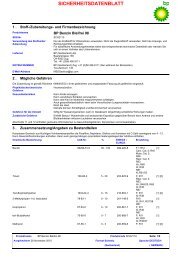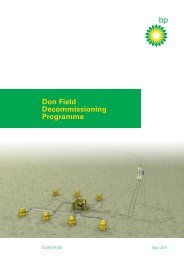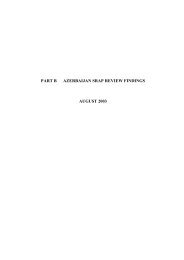Create successful ePaper yourself
Turn your PDF publications into a flip-book with our unique Google optimized e-Paper software.
“Thanks to <strong>the</strong> growth in computing power, better<br />
methods <strong>of</strong> data collection and handling – and, most<br />
importantly, increased brain power – we now know more<br />
about <strong>the</strong> climate system than we did 10 years ago.”<br />
Dr V Ramaswamy<br />
incorporate ‘what if’ scenarios – to gain an<br />
idea <strong>of</strong> how <strong>the</strong> climate may behave if, for<br />
example, oceanic or atmospheric<br />
conditions change.”<br />
With so many processes and scenarios<br />
to consider, developing and running <strong>the</strong><br />
models is a major challenge, as is<br />
interpreting <strong>the</strong> results. Both wea<strong>the</strong>r and<br />
climate are subject to natural variations,<br />
which have nothing to do with <strong>the</strong> forcing<br />
that drives climate change. Sorting out<br />
those variations from <strong>the</strong> effects <strong>of</strong> forcing<br />
requires a major effort. Ironically, says Dr<br />
Ramaswamy, “although we are still not able<br />
to reliably predict climate variability with<br />
our modelling, we can use it to study <strong>the</strong><br />
effect <strong>of</strong> <strong>the</strong> forced variations in order to<br />
get a good handle on how <strong>the</strong> global<br />
climate will change over a timescale <strong>of</strong><br />
decades. And we can also get a good idea <strong>of</strong><br />
what is causing <strong>the</strong> changes.”<br />
Temperature records reveal that during<br />
<strong>the</strong> 20th century <strong>the</strong> climate system as a<br />
whole had warmed. The model results<br />
confirm that most <strong>of</strong> this global warming<br />
can be attributed to observed increases in<br />
concentrations <strong>of</strong> greenhouse gases. These<br />
rises have been strongly influenced by<br />
human activity, with <strong>the</strong> continuous rise in<br />
anthropogenic – or human-generated –<br />
CO2 levels responsible for about 55% <strong>the</strong><br />
warming effect.<br />
But climate modelling is not all doom<br />
and gloom. It is also useful in exploring <strong>the</strong><br />
options for adapting to, and mitigating <strong>the</strong><br />
effects <strong>of</strong>, climate change. The information<br />
derived from climate modelling is already<br />
being used to clarify <strong>the</strong> options policy<br />
makers need to understand in order to<br />
make <strong>the</strong> right choices to prevent fur<strong>the</strong>r<br />
environmental damage. Climate modelling<br />
results will, for example, play an important<br />
role in a two-year study focusing on climate<br />
change and climate choices, beginning at<br />
<strong>the</strong> US National Academy <strong>of</strong> Sciences.<br />
There are a number <strong>of</strong> scientificallybased<br />
options – for example, carbon<br />
capture and sequestration, or planting<br />
more forests – under consideration. “But<br />
whe<strong>the</strong>r <strong>the</strong>se are <strong>the</strong> best options and<br />
whe<strong>the</strong>r <strong>the</strong>y are economically feasible,”<br />
says Dr Ramaswamy, “is ano<strong>the</strong>r question.<br />
Technology> Climate modelling<br />
Developing mitigation strategies for global<br />
warming is – like understanding climate<br />
change itself – a great balancing act, and<br />
decisions must be taken with great care.”<br />
The good news is that <strong>the</strong> technology<br />
for climate modelling continues to<br />
improve. “By developing better ways to<br />
analyse data more intelligently, climate<br />
modellers are increasing our quantitative<br />
understanding <strong>of</strong> how climate works.<br />
Thanks to <strong>the</strong> growth in computing power,<br />
better methods <strong>of</strong> data collection and<br />
handling – and, most importantly,<br />
increased brain power – we know more<br />
about <strong>the</strong> climate system than we did 10<br />
years ago, and this is being fed back in to<br />
improve our understanding even fur<strong>the</strong>r.<br />
Climate modellers have already unravelled<br />
many aspects <strong>of</strong> <strong>the</strong> climate system and<br />
contributed useful information to help <strong>the</strong><br />
world adapt to or mitigate climate change.<br />
Thanks to continuing incremental<br />
advances in observation technology,<br />
coupled with ever-growing computing<br />
power, we’re learning more all <strong>the</strong> time.” ■<br />
Wea<strong>the</strong>r and climate:<br />
what’s <strong>the</strong> difference?<br />
Wea<strong>the</strong>r refers to <strong>the</strong> state <strong>of</strong><br />
atmospheric conditions, such as<br />
humidity, precipitation, temperature,<br />
cloud cover and wind at any one place<br />
at any one time. Climate, in contrast,<br />
refers to <strong>the</strong> characteristic pattern <strong>of</strong><br />
wea<strong>the</strong>r elements over several decades.<br />
Wea<strong>the</strong>r forecasting and climate<br />
modelling generally rely on <strong>the</strong> same<br />
sort <strong>of</strong> data – but treat <strong>the</strong>m in<br />
different ways. The goals are different,<br />
too. For wea<strong>the</strong>r forecasting, <strong>the</strong> aim is<br />
to predict accurately what <strong>the</strong> wea<strong>the</strong>r<br />
will be like a few days in <strong>the</strong> future.<br />
With climate modelling, <strong>the</strong> challenge<br />
is to predict how climate systems will<br />
behave and what will influence <strong>the</strong>ir<br />
behaviour decades into <strong>the</strong> future.<br />
<strong>BP</strong> MAGAZINE Issue 1 2009 51


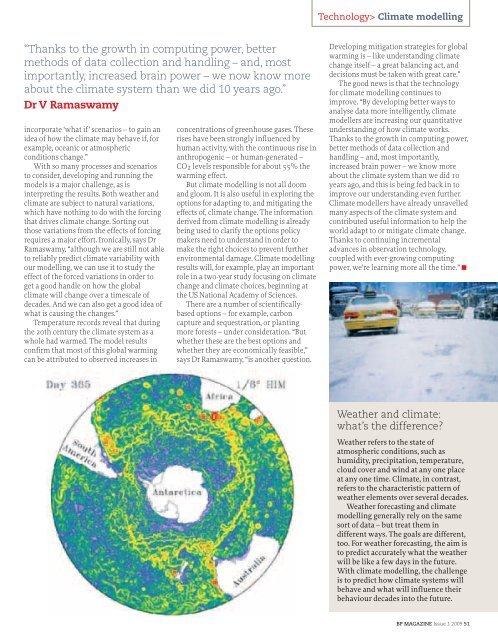

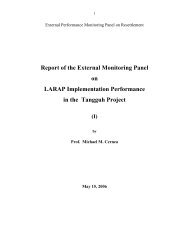

![[PDF] Deepwater Horizon: Accident Investigation Report - BP](https://img.yumpu.com/51697031/1/190x245/pdf-deepwater-horizon-accident-investigation-report-bp.jpg?quality=85)



